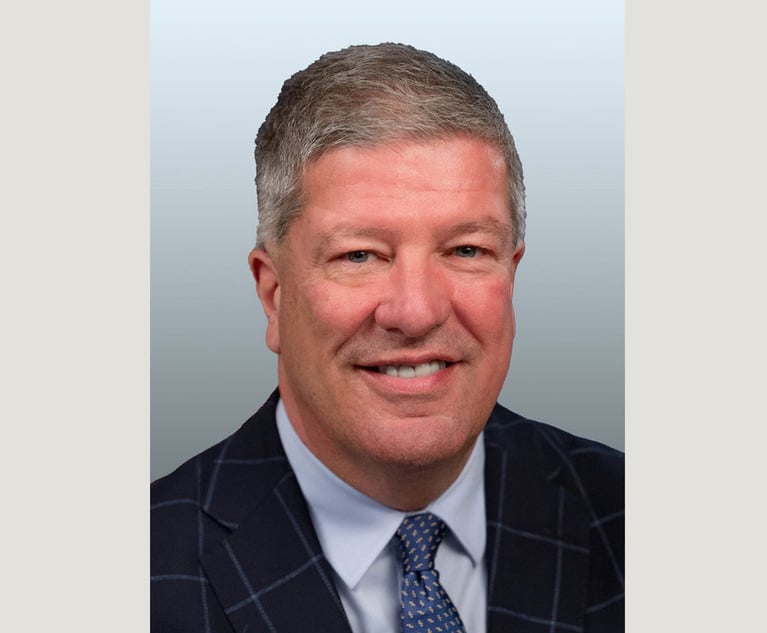Pa. Supreme Court Committee Eyes Med Mal Venue Changes but Defense Bar May Push Back
The state Supreme Court's Civil Procedural Rules Committee last month proposed rule changes that would allow injured plaintiffs to sue in any venue where the health care provider defendants regularly do business. As the rules stand, plaintiffs in medical malpractice cases are limited to suing in the venue where the injury occurred.
January 10, 2019 at 06:39 PM
5 minute read
 Photo: Shutterstock
Photo: Shutterstock
Venue changes the Pennsylvania Supreme Court enacted more than 15 years ago to combat what some saw as out-of-control medical malpractice litigation worked well. Possibly too well, according to some. And now a court rules committee for the high court is proposing to roll back some of those changes.
The state Supreme Court's Civil Procedural Rules Committee last month proposed rule changes that would allow injured plaintiffs to sue in any venue where the health care provider defendants regularly do business. As the rules stand, plaintiffs in medical malpractice cases are limited to suing in the venue where the injury occurred.
The committee is currently seeking comments on the proposal, with Feb. 22 as the deadline for submissions. Saltz Mongeluzzi Barrett & Bendesky attorney David Kwass is chairman of the committee. He declined to comment for the story.
The proposal is widely seen by lawyers as returning the venue rules back to where they were before the Medical Care Availability and Reduction of Errors (MCARE) Act was enacted in 2002.
An explanatory comment to the proposal noted court statistics showing that the total number of medical malpractice cases have dropped nearly 50 percent from the pre-MCARE yearly average. The note also said the drop has caused “a decrease of the amount of claim payments resulting in far fewer compensated victims of medical negligence.”
“The current rule provides special treatment of a particular class of defendants, which no longer appears warranted,” the explanatory comment said. “The proposed rescission of subdivision (a.1) is intended to restore fairness to the procedure for determining venue regardless of the type of defendant.”
Some members of the defense bar are already beginning to voice concerns, saying, among other things, that it will invite forum-shopping.
A letter to the committee by defense attorney Chester Corse of Williamson, Friedberg & Jones took issue with the proposed rule and much of the language in the explanatory comment.
“The fact that the current rule is working is not a reason to eliminate it,” he said in the two-page letter submitted to the board Jan. 4,
Corse added that the comment's references to the size of the payments being made on claims was not an appropriate basis for considering a rule change, and that he thought the reference to restoring “fairness” to the process was likewise inappropriate.
“It presupposes that counties in which medical professional liability actions are now being litigated do not produce fair results,” he said. “This reason is a fundamental attack on the fairness of the courts in which the medical professional liability actions are presently capable of being filed.”
White and Williams attorney Kim Kocher said the defense bar, health care providers and defense-related associations are opposed to the venue change.
“The original purpose of the venue rule—to prevent the undue expansion of venue and forum shopping—remains as significant today as it was in 2002 with the continued consolidation of health care delivery systems in the commonwealth,” she said.
She also noted another key part of the MCARE statute was the requirement that cases be filed with a certificate of merit to show they are not frivolous, and said neither the court statistics nor the claim that the venue rules have resulted in fewer compensated plaintiffs justify the proposed changes.
“As proven by a fair examination of verdicts statewide, no county denies the medical malpractice plaintiff access to justice,” Kocher said.
However, Kline & Specter attorney Shanin Specter, who represents plaintiffs, contended that the argument that medical malpractice cases will spike if the current venue rules are repealed “is advocacy without evidence,” saying filings and insurance rates are both down from where they had been 17 years ago.
“I think there's been unhappiness in the bar generally for the last 17 years about there being two sets of rules—one for health care providers and one for everybody else. So this change is a long time coming,” he said. “Obviously, it's been apparently closely studied by the rules committee, which is made up of defense lawyers, plaintiffs lawyers and judges. It apparently has wide support from both sides of the bar and also the judiciary, and it makes good sense to me.”
Rieders, Travis, Humphrey, Waters & Dohrmann attorney Clifford Rieders, who represents plaintiffs, said he did not think the proposed rules went far enough.
Rieders said he not only supported the rules, but also had asked the committee to consider changes to forum non conveniens rules that would specifically address counties where there is only one hospital and that hospital is a major employer in the region.
Rieders said that, according to figures from the Pennsylvania Patient Safety Authority, only a small fraction of the serious incidents sustained by patients end up in litigation, and he added that, even if the proposals are adopted, defendants can still make the typical jurisdiction and forum non conveniens challenges.
“This rule does not mean you can sue anyone anywhere. They must be found to be doing business there,” Rieders said. “There's still regular venue, and forum non conveniens and jurisdiction challenges. And there are one-hospital counties.”
After the comment period ends, the rules committee can either withdraw the proposal, modify the rules, or pass the proposal to the Supreme Court. If and when the proposed changes are sent to the high court, it will be up to the justices to make the final determination on whether the changes are made.
This content has been archived. It is available through our partners, LexisNexis® and Bloomberg Law.
To view this content, please continue to their sites.
Not a Lexis Subscriber?
Subscribe Now
Not a Bloomberg Law Subscriber?
Subscribe Now
NOT FOR REPRINT
© 2025 ALM Global, LLC, All Rights Reserved. Request academic re-use from www.copyright.com. All other uses, submit a request to [email protected]. For more information visit Asset & Logo Licensing.
You Might Like
View All


Stevens & Lee Hires Ex-Middle District of Pennsylvania U.S. Attorney as White-Collar Co-Chair
3 minute read
Judge Tanks Prevailing Pittsburgh Attorneys' $2.45M Fee Request to $250K
5 minute readTrending Stories
- 1Exits Leave American Airlines, SiriusXM, Spotify Searching for New Legal Chiefs
- 2Etsy App Infringes on Storage, Retrieval Patents, New Suit Claims
- 3The Secret Prior Art Problem Rears Its Ugly Head
- 4Four Things to Know About Florida’s New Law to Protect Minors Online
- 5US Supreme Court Considers Further Narrowing of Federal Fraud Statutes
Who Got The Work
J. Brugh Lower of Gibbons has entered an appearance for industrial equipment supplier Devco Corporation in a pending trademark infringement lawsuit. The suit, accusing the defendant of selling knock-off Graco products, was filed Dec. 18 in New Jersey District Court by Rivkin Radler on behalf of Graco Inc. and Graco Minnesota. The case, assigned to U.S. District Judge Zahid N. Quraishi, is 3:24-cv-11294, Graco Inc. et al v. Devco Corporation.
Who Got The Work
Rebecca Maller-Stein and Kent A. Yalowitz of Arnold & Porter Kaye Scholer have entered their appearances for Hanaco Venture Capital and its executives, Lior Prosor and David Frankel, in a pending securities lawsuit. The action, filed on Dec. 24 in New York Southern District Court by Zell, Aron & Co. on behalf of Goldeneye Advisors, accuses the defendants of negligently and fraudulently managing the plaintiff's $1 million investment. The case, assigned to U.S. District Judge Vernon S. Broderick, is 1:24-cv-09918, Goldeneye Advisors, LLC v. Hanaco Venture Capital, Ltd. et al.
Who Got The Work
Attorneys from A&O Shearman has stepped in as defense counsel for Toronto-Dominion Bank and other defendants in a pending securities class action. The suit, filed Dec. 11 in New York Southern District Court by Bleichmar Fonti & Auld, accuses the defendants of concealing the bank's 'pervasive' deficiencies in regards to its compliance with the Bank Secrecy Act and the quality of its anti-money laundering controls. The case, assigned to U.S. District Judge Arun Subramanian, is 1:24-cv-09445, Gonzalez v. The Toronto-Dominion Bank et al.
Who Got The Work
Crown Castle International, a Pennsylvania company providing shared communications infrastructure, has turned to Luke D. Wolf of Gordon Rees Scully Mansukhani to fend off a pending breach-of-contract lawsuit. The court action, filed Nov. 25 in Michigan Eastern District Court by Hooper Hathaway PC on behalf of The Town Residences LLC, accuses Crown Castle of failing to transfer approximately $30,000 in utility payments from T-Mobile in breach of a roof-top lease and assignment agreement. The case, assigned to U.S. District Judge Susan K. Declercq, is 2:24-cv-13131, The Town Residences LLC v. T-Mobile US, Inc. et al.
Who Got The Work
Wilfred P. Coronato and Daniel M. Schwartz of McCarter & English have stepped in as defense counsel to Electrolux Home Products Inc. in a pending product liability lawsuit. The court action, filed Nov. 26 in New York Eastern District Court by Poulos Lopiccolo PC and Nagel Rice LLP on behalf of David Stern, alleges that the defendant's refrigerators’ drawers and shelving repeatedly break and fall apart within months after purchase. The case, assigned to U.S. District Judge Joan M. Azrack, is 2:24-cv-08204, Stern v. Electrolux Home Products, Inc.
Featured Firms
Law Offices of Gary Martin Hays & Associates, P.C.
(470) 294-1674
Law Offices of Mark E. Salomone
(857) 444-6468
Smith & Hassler
(713) 739-1250





